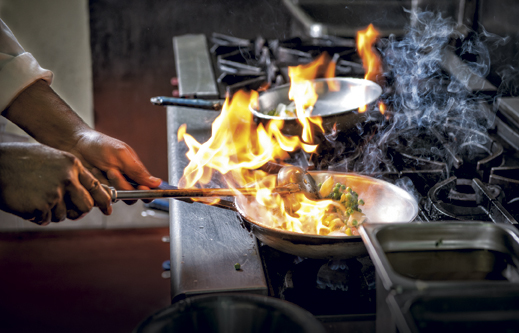FOODBORNE ILLNESS: WHAT THEY DON’T KNOW CAN HURT THEM
Agents can help restaurant owners and managers better understand regulations, exposures, protection needs, coverage options, and more
By Crystal Jacobs
Restaurant owners and managers have a hundred things to worry about on a daily basis, including staying on top of supply chains, employee needs, local competition and customer satisfaction. The last thing they want to think about is whether they are protected against every possible exposure.
Most assume that their policies for general liability, property and liquor liability cover all the bases, but they actually don’t. In fact, up to 90% of restaurants, mostly small and mid-sized establishments, may be missing critical coverage for foodborne illness outbreaks that can result in major business interruptions and financial losses.
[A] restaurant may find that its standard insurance policies don’t cover things like inspection costs, employee wages, equipment cleaning, store disinfection services, and perhaps most important, publicity expenses needed to maintain reputation and inform the public that the issue is being handled swiftly and carefully.
As the people responsible for supplying clients with the best information and advice on how to protect their business, agents and brokers need to communicate the benefits of supplemental coverages to protect clients from events they may have overlooked or assumed their existing policies would cover.
The gap
One of the biggest tasks an agent faces is trying to identify exposures and offer coverages that meet those needs. Coverage for foodborne illness outbreaks is one of the most commonly missed protections. Restaurants, particularly small- to mid-sized independent ones, can have a huge obstacle to overcome when attempting to rebuild their business after a major event.
While large chains and national brands may have the financial strength to weather store closings or negative press, smaller brands can suffer major setbacks or even bankruptcy from foodborne illness outbreaks. Further, most large chains are already aware that the coverage exists, as they have been the primary focus for most carriers over the past 20 years. That’s not necessarily the case with smaller establishments. To paraphrase the common wisdom, many restaurant owners don’t know what they don’t know.
After a foodborne illness event takes place, a restaurant may find that its standard insurance policies don’t cover things like inspection costs, employee wages, equipment cleaning, store disinfection services, and perhaps most important, publicity expenses needed to maintain reputation and inform the public that the issue is being handled swiftly and carefully.
The protection
Foodborne illness coverages have been available for quite some time, but the insurance industry has not done enough to educate the small- to mid-sized independent restaurant community on its full exposure and may have miscalculated the ROI of insuring smaller restaurant risks, since premiums are small. When foodborne illness coverages are explained alongside specific data, owners can make informed decisions about their risk vs. the assurance provided by supplemental coverage.
No agent wants a client to suffer a non-covered event, so it’s vital to have annual conversations about new local regulations or changes to the client’s business. Armed with information from insurance carriers, including any available brochures or marketing materials, agents can quickly and clearly explain the benefits and risks to educate clients on how they can best protect their business investments and reputation.
First off, many business interruption policies may not cover employee salaries, mandatory cleanings, sanitizing, equipment replacement and more in the case of a foodborne illness outbreak. A good foodborne illness package will cover all of those costs. But paying workers and eliminating the cause of the outbreak won’t do much to regain public trust or counter negative media coverage. That’s why some foodborne illness insurance packages offer a third-party crisis communications team to help deal with media and public sentiment.
Added support
A verified foodborne illness outbreak requires immediate public notification to the local public health department, so there’s no getting around the dreaded “health scare” scenario that often drives a restaurant’s traffic to zero. Even if the health department allows the restaurant to remain open, customers generally want to know everything is 100% fixed and safe before they are comfortable returning. This is why the availability of a crisis communication team can make a huge difference in a restaurant’s post-outbreak success.
Crisis communication teams may also provide customer support for anyone who is affected by the outbreak, arranging health services such as vaccinations and doctor visits. They also could provide an information hotline where operators ensure every step is taken to properly address each customer’s issues and needs. By doing everything in its power to help those affected and alleviating any complaints or issues while documenting the process, a restaurant and its insurance carrier help prepare for potential litigation.
Another important consideration is the potential lack of manpower a restaurant may have when called on to effectively respond to thousands of customers who may begin worriedly calling, looking for information or expressing anger. Even if a restaurant only serves 500 unique customers each week, it would be almost impossible for an owner to manage every call or complaint. So, while it may technically be allowed to remain open, normal operations grind to a halt and owners and staff can struggle to regain their footing.
Market opportunity
Every business that sells freshly prepared food—from delis to buffets to diners and more—can be subject to business disruptions and legal claims resulting from a foodborne illness outbreak. The need is especially great among owners with one location or a handful, because major chains have enormous resources to protect and rebuild from an event and the accompanying negative public sentiment. A single-location owner doesn’t necessarily have the revenue support from other locations to keep afloat during a downturn.
Once clients recognize the potential loss of revenue, the long-term harm to the brand and business, the liabilities such as salaries and location costs, and the potential litigation that can arise from a foodborne illness outbreak, they will likely see how important supplemental coverage is. They will understand that having proper coverage can make the difference between survival and bankruptcy.
Every agent with restaurant clients should communicate this potentially devastating risk in order to provide the best protection and assistance available. When a foodborne illness outbreak hits, will clients look to their agents as saviors, or will they bang down the door asking why they aren’t covered?
 The author
The author
Crystal Jacobs is the Restaurant Guard vice president and program director at U.S. Risk.
Restaurant Guard Insurance offers restaurant industry insurance solutions that include contamination coverage for foodborne illness and a range of options for professional, management and staff liability, including losses caused by terrorism or terroristic threats.
Headquartered in Dallas, Texas, Restaurant Guard Insurance is a division of the U.S. Risk Insurance Group, a specialty lines underwriting manager and wholesale broker with 16 domestic and international branches. Visit www.restaurantguardinsurance.com or contact Crystal Jacobs at Crystal.Jacobs@restaurantguardinsurance.com.





